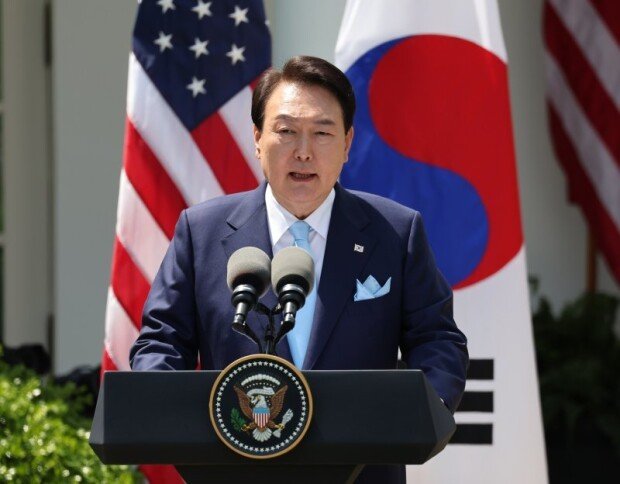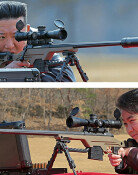S. Korea, US to establish Nuclear Consultative Group
S. Korea, US to establish Nuclear Consultative Group
Posted April. 27, 2023 07:54,
Updated April. 27, 2023 07:54



South Korean President Yoon Suk Yeol and U.S. President Joe Biden held a summit on Wednesday (local time) and decided to establish the Nuclear Consultative Group (NCG), which guarantees South Korea’s participation in the U.S.’s provision of nuclear deterrence (nuclear umbrella) in case of emergency, such as North Korea’s nuclear missile attacks. The deployment of strategic assets in response to North Korea’s nuclear threats will significantly expand, including ballistic missile submarines (SSBNs) visiting South Korea for the first time in over 40 years after they disappeared in South Korean waters in the 1980s.
The ROK-U.S. cyber security strategic framework will also be operated against the North’s electronic warfare, such as hacking. While more and more South Koreans agree with the country’s own nuclear armament, South Korea decided to continue its compliance with the Treaty on the Non-Proliferation of Nuclear Weapons (NPT) as the U.S. proposed such measures to strengthen nuclear deterrence.
President Yoon met with President Biden on Wednesday during his state visit to the U.S. and adopted the ‘Washington Declaration,’ which includes the above measures for stronger nuclear deterrence. The NCG is intended to share information on the U.S.’s response to each scenario of North Korea’s use of nuclear weapons and set up a permanent consultative group that guarantees South Korea’s institutional participation in such a response process. It is similar to NATO’s Nuclear Planning Group (NPG), which is a mechanism to share the process of nuclear and strategic weapon use with allies, except for the deployment of strategic nuclear weapons.
“It is meant to help South Korea’s understanding of how the U.S. develops contingency plans and to give them a voice in those deliberations,” said a senior U.S. official before the summit. His comment can be interpreted as giving South Korea the right to voice its opinions on the U.S.’s nuclear responses in case of contingency, such as North Korea’s nuclear attacks. “A mechanism that encompasses extended deterrence, information sharing, joint planning, and joint execution will be operated in a more organic manner,” said Lee Do-woon, a spokesperson of the South Korean presidential office, at a local press center in Washington, D.C.
A senior U.S. official also said that the U.S. decided to regularly deploy strategic assets, including strategic nuclear submarines equipped with ballistic missiles with nuclear warheads, to the Korean Peninsula as North Korea raises its threats of nuclear missiles. However, he drew a line by saying that the country does not have any plan to redeploy any nuclear weapons, including strategic nuclear weapons, to the peninsula. The official said that decisions on the use of nuclear weapons are the sole authority of the U.S. president.
Kwan-Seok Jang jks@donga.com







